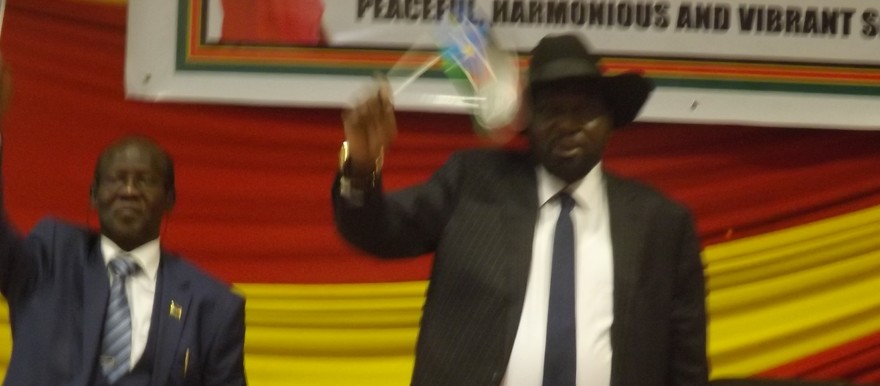The President of South Sudan has described himself in a speech on Wednesday as the ‘midwife’ of the Sudan People’s Liberation Movement (SPLM), casting himself as the founder of the movement rather than John Garang, who led the rebel movement from 1983 until his death in 2005.
Salva Kiir addressed a gathering of his SPLM supporters on Wednesday in Juba. The occasion was formally a council meeting of the SPLM youth league, but many senior party cadres were in attendance including ministers and Vice President James Wani.
“I fought before you,” he told his audience.
Kiir recounted a conversation that he had had with an unnamed person many years ago, in which he was challenged about his credentials as a founding member of the movement.
“Somebody very antagonistic who does not want the SPLM [once] asked me, ‘When did you join the SPLM?’ We were discussing with him. I told him, ‘I did not join the SPLM. I was the midwife and I delivered SPLM itself,’” Kiir said.
The president continued: “He said to me, ‘Oh, I see, so this is why you have been at the centre of things’. I said, ‘Yes, if you think that I am now in the centre. By that time Dr. John was alive.”
“Now for me, SPLM started with me,” Kiir added at a later point in the speech, after also recounting some details of the earlier Anyanya I struggle.
The speech is an indication that Kiir considers himself the true founder of SPLM rather than his predecessor in the role of SPLM chairman, John Garang, who is more widely considered the founder of the rebel movement that became South Sudan’s ruling party.
Kiir was originally junior to four others in the SPLM/A Political-Military High Command: John Garang himself, Kerubino Kuanyin, William Nyuon, and Martin Majier. He also had an antagonistic relationship with Garang prior to the latter’s death, culminating in the tense and inconclusive Rumbek meeting of 2004, where Kiir complained that Garang would not make structural changes to give him more power, according to minutes of the meeting.
The statement by Kiir on Wednesday about being ‘in the centre’ of the SPLM even while Garang was still alive echoes remarks that he made at the historic Rumbek meeting of 2004 in which he depicted Garang as a “briefcase” leader who was frequently abroad whilst presenting himself as a commander closer to the front lines of the struggle.
Kiir also acknowledged during the meeting that he had refused a summons by the SPLM chairman out of fear of being arrested by Garang. “The rumours implied that I will be arrested at Ramciel where the Chairman was, so I decided not to go,” Kiir reportedly said at the historic meeting.
Garang himself, however, repeatedly denied at the 2004 meeting that he planned to arrest Kiir. He died one year later in an aircraft accident.
Malik Agar, a long-time SPLA commander who is now the leader of SPLA-North, was quoted as saying at the Rumbek meeting that he was aware of differences between the two men going back ten years. “Whenever it is about to be addressed, each of them says there is ‘no problem’. The big problem is trust among yourselves.”
Another SPLM figure, Ayual Makol, warned that the differences between Garang and Kiir could result in civil war within the movement: “To achieve our objective, we must be united. If the two leaders of the Movement only agree to disagree, then it will lead to internal warfare.”
Doubting loyalty of SPLM Caucus
In his speech on Wednesday, meanwhile, Kiir expressed doubts about the loyalty of his own SPLM members of parliament, suggesting that they may select a speaker of parliament whom he does not approve.
Selection of the new speaker has delayed formation of the Transitional National Assembly.
“Our members of the parliament who are here should go and talk among themselves. Because we are told now that why don’t you put it to elections? And you have the majority. I said no, I don’t want it, and even I don’t trust your majority. Yes, you have two-thirds in the parliament but if one-third goes and defects, what will happen? Well they will just give it to the other side. This is what we don’t want.”
“I want you really to be clear about this. And most of the adopted children are in the parliament,” he said, possibly in reference to members of the party who joined SPLM only late in the liberation struggle or after it had ended.
South Sudan’s peace deal says that the speaker of the assembly must be an Equatorian. Many members of the Equatorian Caucus, including those belonging to the SPLM, boycotted key recent votes on legislation supported by Kiir, including the National Security Service bill and proposed constitutional amendments intented to legalize the Establishment Order, which created 28 controversial new states.
Votes on both of those bills failed to reach quorum, in spite of the overwhelming numerical majority of SPLM in the assembly.
Chapter I, Article 11.4 of the peace deal states, “The selection of the Speaker of the TNLA, who hails from Equatoria, shall be conducted once the expansion of the membership of the Assembly is complete.”
It further states that the duration and term of the transitional assembly shall run concurrently with the transitional government. According to some MPs who are critical of the delay forming the new assembly, this means that currently South Sudan has no legal parliament.
MP Thomas Wani Kundu, a former committee chairman who was ousted from his role for opposing the recently proposed constitutional amendments, has called the current assembly “illegal”. In the meantime, the failure to establish the new parliament potentially puts into jeopardy budget-setting procedures for the next fiscal year.
Correction: This speech took place on Wednesday, 29 June, not on Tuesday as originally reported in this article.




